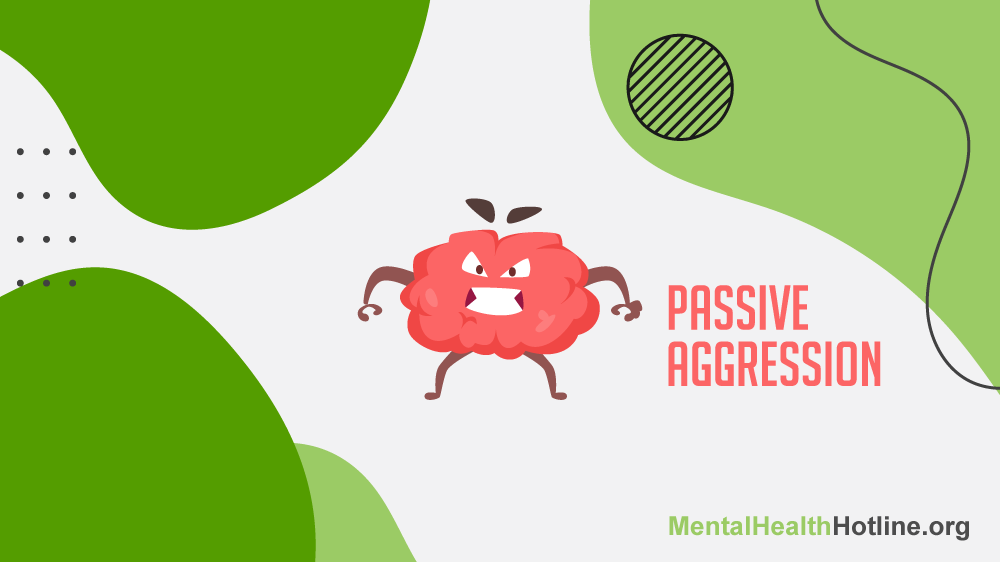Have you ever lived with someone who avoids all perceived conflict? Maybe a roommate dodges your calls when you’re upset or won’t talk about household issues. Passive-aggressive behaviors can include everything from giving you the silent treatment to sulking or playing the victim.
What Is Passive Aggression?
Before you can start working on passive-aggressive habits or dealing with passive-aggressive behaviors from others, you need to clearly understand what they are. Let’s take a moment to define passive-aggressive.
Passive-aggressive is a habit of indirectly expressing negative feelings instead of openly dealing with them. Someone may ask, “Why am I passive-aggressive?” Well, many people develop passive-aggressive habits due to feelings of insecurity and powerlessness. When you don’t feel you have any autonomy or the ability to control your environment, it can lead to passive aggression.
People with a passive-aggressive personality may demonstrate the following:
- Passive resistance when asked to complete a task
- Frequent complaining
- A tendency to argue
- Sullen or grumpy moods
- Bitterness toward authority figures
- Envy
- Constant complaining about personal misfortune
- Indecisiveness
- Low self-esteem
- Catastrophizing or pessimism
- Procrastination
- Insincere forgetfulness
- Blame shifting
These personality indicators might express themselves as backhanded compliments, procrastinating on project deadlines or avoiding confrontation.
Is It a Sign of a Mental Health Condition?
Everyone sometimes gets angry, feels frustrated or has a bad day. These are all normal, but how you express and deal with these negative emotions can vary. If you use passive aggression to communicate your negative feelings, it might be linked to behavior you learned in childhood. If simple, direct communication didn’t result in your needs being met, you might have learned more indirect methods to communicate what you needed. Children who don’t feel safe asking for attention or things may resort to manipulation to get what they need.
While it’s common for children to learn passive-aggressive behaviors, it’s also possible to develop them as an adult or due to various mental disorders such as:
- Anxiety disorders
- Attention deficit hyperactivity disorder (ADHD)
- Depression
- Substance abuse
- Personality disorders
In the early editions of the Diagnostic and Statistical Manual of Mental Disorders (DSM), passive-aggressive personality disorder was a diagnosis all its own. For those with anxiety disorders, direct communication can be an insurmountable barrier. For example, if you have social anxiety, it may be nearly impossible for you to tell someone what’s wrong. Instead, your anxiety can cause you to freeze and display your emotions using passive-aggressive behaviors.
With ADHD, avoidance is a common problem. Many people with ADHD go through childhood hearing things like “If it were important to you, you’d do it” or “You have so much potential; I don’t know why you can’t (fill in the blank).” These statements aren’t helpful for those with executive dysfunction that prevents them from developing habits or performing multi-step tasks.
Depression is often characterized by a lack of energy. When you always feel tired, generating the energy to confront your problems head-on is challenging. In some cases, getting out of bed is enough of a challenge for the day.
The guilt and shame associated with many mental health disorders, including substance use disorder, can mean that direct communication, particularly regarding behaviors due to your disorder, is tough.
How Passive Aggression Can Signal Unhappiness
Learning what’s passive-aggressive can help you understand why it’s a sign of unhappiness. If you can’t directly express anger, you might resort to sarcasm or sulking. If you can’t confront the source of your sadness, you might pout and avoid the problem. Ultimately, all your passive-aggressive behaviors express one thing: negative emotions.
How Passive Aggression Impacts Other People
While passive aggression may seem like a better option than shouting or more directly expressing your feelings, it can be challenging for others to deal with. Assertive communication allows you to address and solve problems. Passive-aggressive communication may require investigation to determine the source of the angst causing the behavior.
Learning assertive communication and leaving passive-aggressive behaviors in the past takes practice, but you can do it. The more you ask directly for what you need — and get a positive response — the easier it becomes. Mental Health Hotline provides access to a nationwide network of mental health providers that can help you develop your communication skills. Reach out today.
